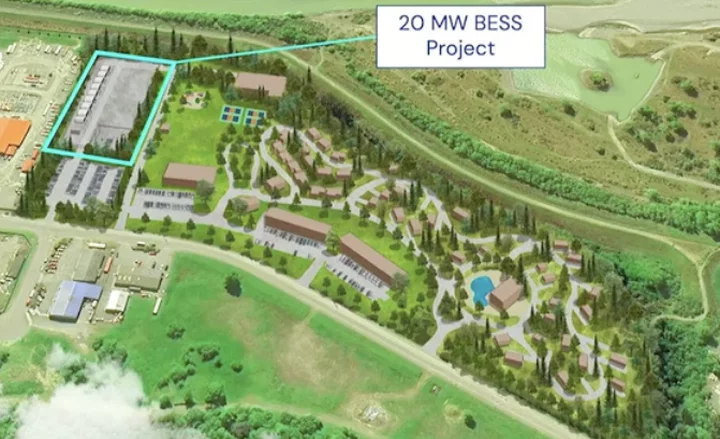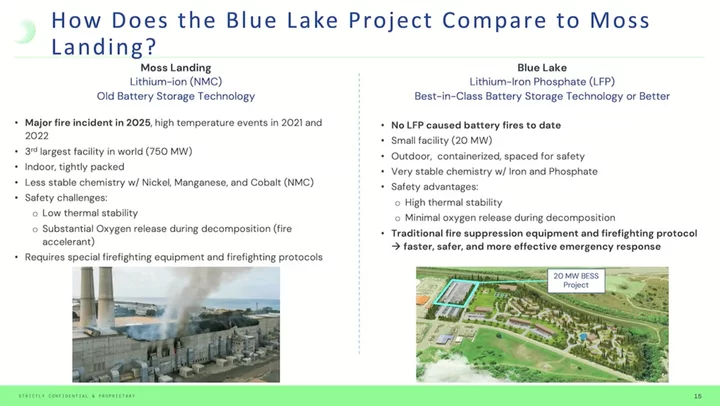An aerial view of the proposed battery energy storage system. | Screenshot
###
A standing-room-only crowd packed the Blue Lake Fire Hall on Sunday to voice opposition to a controversial project that, if approved, would turn the city’s defunct power plant into a lithium-iron-phosphate battery energy storage facility. The Blue Lake City Council is expected to make a decision on the proposed project at a meeting tomorrow night.
The project proposal, submitted by Texas-based energy developer PowerTransitions, outlines plans to demolish and remove some of the existing infrastructure at the disused power plant, though the transformer and substation would be repurposed for a 20-megawatt (MW) battery energy storage system (BESS). Under the proposed agreement, the city would sell two acres of the Powers Creek District site to PowerTranstions and their staff would handle the costs associated with site clean-up, which would cost the city up to $1.5 million to complete.
Once it’s fully built out, the BESS would include 10-20 battery units that would store renewable energy for local providers, including the Redwood Coast Energy Authority (RCEA).
The project has drawn criticism from many Blue Lake residents who fear the facility would have “catastrophic consequences for [the] beautiful small city,” as stated in an online petition against the project that has gained 119 signatures. Some residents fear the facility would contaminate the water supply if a flood were to occur, while others worry that a system failure or a nearby fire could cause “explosions and release toxic gases,” similar to what happened last month at the Moss Landing Vistra Power Plant in Monterey County.
Speaking at Sunday’s contentious meeting, PowerTransitions Senior Advisor Jeff Goldstein went over the various benefits of the project, which would provide a five-day energy supply during a long-term outage. He also said he was “keenly aware of all of the risks associated with this technology,” adding that the Blue Lake BESS would use lithium-iron phosphate batteries, not lithium-ion batteries that can be dangerous if damaged or overcharged. He shared the following slide to illustrate his point.
Screenshot
“What happened at Moss Landing is a tragedy [but] the rules and regulations that we are being held to didn’t exist when [that] project was built,” Goldstein said to the crowd of 100-plus residents, adding that the Moss Landing Power Plant was 750 MW whereas the project proposed for Blue Lake is only 20 MW.
Other residents took issue with PowerTransitions CEO Sean T. Long who used to work for Enron, which filed for bankruptcy in 2001 following a massive accounting scandal that upended the national energy industry. Goldstein was quick to defend his boss, noting that Long’s “ethics are impeccable.”
“Some people here have said ‘You have a corrupt CEO! He worked for Enron, a company that went bankrupt.’ Well, let’s get the truth out,” he said. “This guy was in his 30s … he wasn’t an officer of the company, he was an officer of the region in Africa. Okay? He had nothing to do with what happened in Enron.”
[CLARIFICATION: After the publication of this story, one of our readers shared a link to an article published in the Houston Chronicle that details court proceedings in which Merrill Lynch executives were convicted for aiding Enron in fraudulent accounting practices, including the infamous Nigerian barge deal. The article includes testimony from Long, who “headed Enron’s African investment division … in 1999” and admitted to engaging in “wrongful conduct” and “assisting in the takeout of Merrill Lynch.”]
Unfortunately for Goldstein, many of the meeting attendees didn’t seem interested in hearing what he had to say. The video recording of the meeting — linked below — is almost impossible to understand at some points because Zoom has a tendency to mute when people talk over one another during virtual meetings. Still, it was clear that people weren’t happy.
Reached for additional comment via email, Blue Lake City Manager Amanda Mager was eager to dispel misinformation surrounding the battery storage facility. She emphasized that the proposed project “in no way resembles Moss Landing,” adding that battery storage technology is a critical component in “fully harness[ing] the benefits of renewable resources … .”
“I don’t know anyone in our community that would ever advocate for something resembling that project,” Mager told the Outpost. “The proposed project is not in an enclosed building, does not include the same type of batteries and isn’t anywhere near the size of that facility. The project proposed for Blue Lake is community scale and has been replicated all over the world.”
Mager added that the city has been working with the RCEA for years to find a way to transition the power plant. “[W]e entered into an MOU with RCEA to act in an advisory role to the City to specifically look at a small-scale BESS for future investment. As RCEA has been acquiring renewable energy resources as part of the local energy portfolio, it was hoped that the City could leverage the inter-connect that exists on the property to help us clean up the property and to participate in the renewable energy industry.”
###
The Blue Lake City Council will consider an agreement to move forward with PowerTransitions’ proposal at Tuesday’s meeting. The council will meet at 6:30 p.m. at the Skinner Store — 111 Greenwood Road in Blue Lake. The full agenda and remote viewing/participation instructions can be found at this link.
###


CLICK TO MANAGE